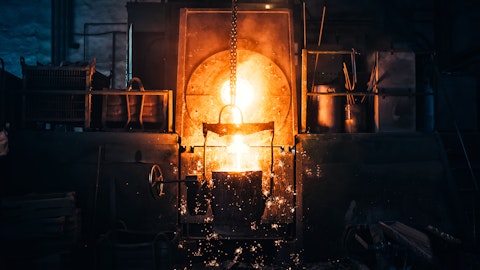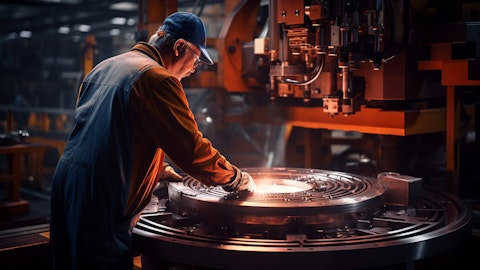Maximo Vedoya: Thank you, Cairo [ph]. I will take both questions. The announcement of the measures in Brazil, as I said, in my initial remarks; I think that the measurements are our first step in the right direction. Will these measures be enough to combat unfair trade practices, mainly from China? I am not sure. I think that a little bit more is needed. I mean, as you know, we — I don’t have the exact description of how this is going to be implemented. As you know, it was made public in a conference call but I don’t have yet the details of how it’s going to be implemented. But as I saw it, the numbers or the quota that is allowed to be imported in some of the products, it’s still an important quota; so I don’t know if it’s going to have an impact in prices.
But again, as I said, I think it’s a good first step. And we should continue working as other governments are working. I know, these measures are being made in the US, in Mexico, in Europe, in Turkey, a lot of countries are taking these measurements because of what is happening in China; as you realized, last month was one of the highest exports of the history of China in steel products, more than 10 million tons in one single month. So China is dumping it’s steel everywhere now, and most of the countries are shutting down that unfair trade imports. So it’s not enough but it’s a good first step. I hope I answered that question with this; the first question, Cairo [ph].
Unidentified Analyst: Yes, absolutely. Very clear. Thank you.
Maximo Vedoya: Perfect. The blast furnace — this blast furnace is number one in Brazil [ph] — in turning Brazil facility in real experience which is a temporary disruption due to some unexpected outage in the last days of the first quarter; I think it was on 28th or 29th of March. And we are now — the blast furnace is now undergoing a restart process; so there’s a huge — when a blast furnace account a little bit, you have a long process for the restorage or the restart process. And we are now in that restart process. Having known the problem we already purchased enough slabs to comply with all our commitment with the customers, we don’t expect any noticeable impact on our shipment. Also we have already purchased all the slabs we need; so we don’t expect any main impact on shipments.
Unidentified Analyst: Understood. Thank you, Maximo. Very clear.
Operator: Our next question comes from the line of Tim Tanners [ph]. Please go ahead.
Unidentified Analyst: Hey, good morning. Thanks for the time. I wanted to probe the guidance commentary a bit more. So, you talked about lower prices in most markets, what market might not be seeing lower prices? And then you’ve talked about EBITDA and EBITDA margins but can we talk about costs a bit more, and specifically when you might see the benefit of some declines in coking coal prices?
Maximo Vedoya: Yes, I mean, in all markets, we’re seeing a little bit of a lower prices not exactly in Brazil, but it depends on the exchange rate — that will depend a little bit on the exchange rate, when you see it in dollar terms. What we are going to see in Mexico is that you will have a lower prices in the contract, right, in the contract sales because of the lack every quarter we have. But prices in the commercial market are increasing right now. So it’s a mix between a lower price because of the contract and an increase in prices that we are seeing in our shipments to the commercial market. Overall, the price will probably be a little lower than the ones indeed in this quarter.
Pablo Brizzio: Okay. If you want to however go into the cost side of the equation, what we are expecting to see is same level of cost because it was a mixture of different things. We are going to reflect as usual the price of slabs that we bought a couple of quarters ago, and then we have not yet seen decline in the price of that raw material. There is also a change in the cost of the iron ore that is more immediate to see that that impact in our numbers. The increased profitability in the Usiminas numbers or the Usiminas production will be also be reflected during next quarter and the following. As Maximo was explaining that, the performance of the blast furnace example — after the realigning [ph] is starting to get upto a steady level.
Though as Usiminas presented the numbers yesterday, you will have the impact of the increased price of slabs purchased in the market that will be impacted during the second quarter. So all in all, is why we are expecting to see a relatively stable level of cost for next quarter.
Unidentified Analyst: Okay. And coking coke, it sounds like it takes a while to flow through then [ph]?
Pablo Brizzio: Yes. Well — yes, exactly. It’s something that we are buying for our operation in Brazil. And it takes a little while for it to be reflected in in our modern life [ph].
Unidentified Analyst: Okay, thanks for that. And then, I wanted to ask a little bit about the cadence of ramp up if you could remind us on Pesquería [ph]. You have the galvanizing lines; you also then of course, have the DRIEAS [ph] complex. So if you could remind us about the timing and also any update on project costs given that we’ve seen some broad inflation across many of these types of projects? How are you tracking there?
Maximo Vedoya: Yes. Costs, we don’t have any update besides the one we gave the last quarter where we increased a little bit. But we are seeing that the cost will be that one; I think it was $3.4 billion [ph]; the total cost of all the — the Pesquería 3 as we call it project. Regarding timing, the first line that is coming online, it’s coming in July with a ramp up, of course, it’s the peaking line [ph], and then the customers lines are starting one also in July and going forward the other four; two months, each one. So by the end of the year we will have the five lines of the customers lines working. Then we have the galvanized line; the galvanized 2 as we call it. That it’s going to start by the end of 2025, the coal [ph] rolling line, the PLT CM2 [ph], as we call it, that is going to start in March of 2026. And then, we have the CIF DRI [ph] facility, that is going to start — we are appointed to the middle of 2026.

